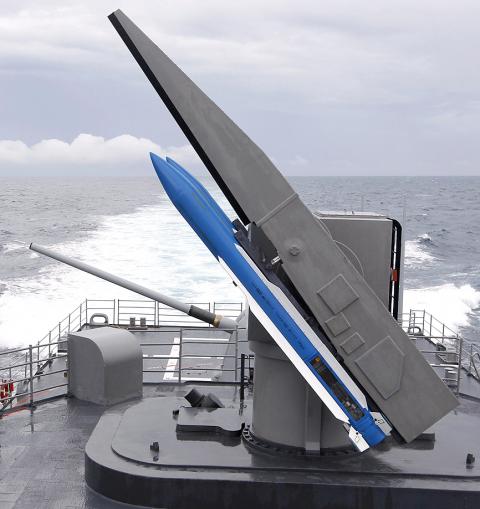The dispute between Taiwan and the Philippines is unrelated to the “one China” principle and Taipei will lodge a protest if Manila cites it as the basis for its handling of the matter, Mainland Affairs Council (MAC) Minister Wang Yu-chi (王郁琦) told lawmakers yesterday.
“What happened between Taiwan and the Philippines is the business of the two countries, it has nothing to do with the ‘one China’ principle,” Wang said in response to lawmakers’ questions about Philippine President Benigno Aquino III’s recent remark that the dispute would be handled in accordance with Manila’s “one China” policy.
“The government of the Philippines should positively respond to the calls made by the Republic of China government as soon as possible,” Wang said at a meeting of the Internal Administration Committee at the legislature in Taipei.

Photo: Pichi Chuang, Reuters
Asked to comment on China’s expression of support for Taiwan because “Taiwan is part of China,” Wang thanked Beijing for its support, but said it should stay out of the dispute.
“We appreciate China’s concern over the killing of a Taiwanese fisherman. However, the council has contacted China’s Taiwan Affairs Office, urging China to stay out of the dispute,” Wang said. “We have informed them that their expression of concern over the issue would only make things more complicated at this time and we hope they understand this.”
Since the death of fisherman Hung Shih-cheng (洪石成) last week, China has voiced its concern several times and it reportedly sent a naval fleet through the disputed waters in the Bashi Channel on Wednesday.
The committee adopted a resolution urging the council to deliver an official notice to China, asking it to refrain from getting involved in the dispute.
Additional reporting by staff writer

INVESTIGATION: The case is the latest instance of a DPP figure being implicated in an espionage network accused of allegedly leaking information to Chinese intelligence Democratic Progressive Party (DPP) member Ho Jen-chieh (何仁傑) was detained and held incommunicado yesterday on suspicion of spying for China during his tenure as assistant to then-minister of foreign affairs Joseph Wu (吳釗燮). The Taipei District Prosecutors’ Office said Ho was implicated during its investigation into alleged spying activities by former Presidential Office consultant Wu Shang-yu (吳尚雨). Prosecutors said there is reason to believe Ho breached the National Security Act (國家安全法) by leaking classified Ministry of Foreign Affairs information to Chinese intelligence. Following interrogation, prosecutors petitioned the Taipei District Court to detain Ho, citing concerns over potential collusion or tampering of evidence. The

‘FORM OF PROTEST’: The German Institute Taipei said it was ‘shocked’ to see Nazi symbolism used in connection with political aims as it condemned the incident Sung Chien-liang (宋建樑), who led efforts to recall Democratic Progressive Party (DPP) Legislator Lee Kun-cheng (李坤城), was released on bail of NT$80,000 yesterday amid an outcry over a Nazi armband he wore to questioning the night before. Sung arrived at the New Taipei City District Prosecutors’ Office for questioning in a recall petition forgery case on Tuesday night wearing a red armband bearing a swastika, carrying a copy of Adolf Hitler’s Mein Kampf and giving a Nazi salute. Sung left the building at 1:15am without the armband and apparently covering the book with a coat. This is a serious international scandal and Chinese

Seventy percent of middle and elementary schools now conduct English classes entirely in English, the Ministry of Education said, as it encourages schools nationwide to adopt this practice Minister of Education (MOE) Cheng Ying-yao (鄭英耀) is scheduled to present a report on the government’s bilingual education policy to the Legislative Yuan’s Education and Culture Committee today. The report would outline strategies aimed at expanding access to education, reducing regional disparities and improving talent cultivation. Implementation of bilingual education policies has varied across local governments, occasionally drawing public criticism. For example, some schools have required teachers of non-English subjects to pass English proficiency

TRADE: The premier pledged safeguards on ‘Made in Taiwan’ labeling, anti-dumping measures and stricter export controls to strengthen its position in trade talks Products labeled “made in Taiwan” must be genuinely made in Taiwan, Premier Cho Jung-tai (卓榮泰) said yesterday, vowing to enforce strict safeguards against “origin laundering” and initiate anti-dumping investigations to prevent China dumping its products in Taiwan. Cho made the remarks in a discussion session with representatives from industries in Kaohsiung. In response to the US government’s recent announcement of “reciprocal” tariffs on its trading partners, President William Lai (賴清德) and Cho last week began a series of consultations with industry leaders nationwide to gather feedback and address concerns. Taiwanese and US officials held a videoconference on Friday evening to discuss the